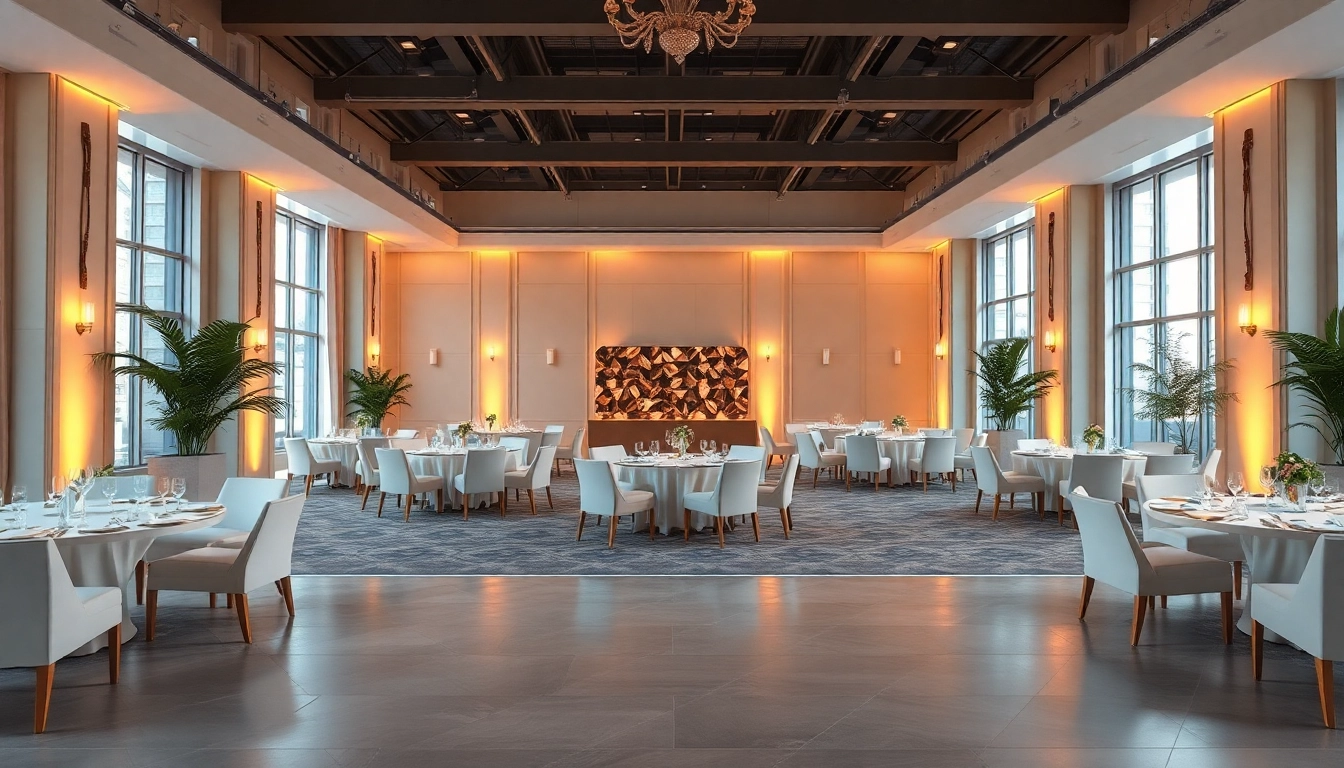The Importance of Selecting the Right Event Space
Choosing the appropriate event space for your gathering can make or break the experience for your guests. Whether you’re planning a corporate meeting, a wedding, or a casual get-together, the venue has a significant influence over the atmosphere, accessibility, and overall execution of your event. A well-chosen event space can enhance the occasion, while the wrong choice can lead to logistical challenges and unsatisfied attendees. This article will guide you through the essential considerations for selecting your ideal venue, key features to evaluate, creative ideas for design, logistical planning, and effective promotion strategies to ensure your event stands out.
Understanding Your Event Needs
Before diving into venue options, it’s crucial to clearly define the requirements of your event. Consider the following questions:
- What is the purpose of your event? (e.g., networking, celebration, education)
- How many guests are you expecting?
- What is your budget for the venue?
- Do you need specific facilities? (e.g., breakout rooms, audiovisual equipment)
- What is the desired atmosphere? (e.g., formal, casual, festive)
Having clear answers to these questions will help you narrow your focus when searching for the perfect event space. Define your goals and expectations to maximize the effectiveness of the occasion.
How Location Influences Guest Attendance
The location of your chosen event space can significantly impact guest attendance. A conveniently located venue with easy accessibility can attract a larger crowd, whereas a remote or hard-to-reach location may deter participants. Factors to consider when evaluating location include:
- Proximity to major transportation hubs: Ensure the venue is near airports, train stations, and main roads.
- Parking availability: If many guests will arrive by car, ample and affordable parking is essential.
- Safety and security: Choose a neighborhood known for its safety to ensure peace of mind for attendees.
- Nearby amenities: Restaurants, hotels, and entertainment options can enrich the guest experience.
Researching and ensuring the venue’s location aligns with these factors can significantly enhance the overall experience for your guests.
Choosing Between Indoor and Outdoor Event Space
The choice between indoor and outdoor venues can depend on several key factors, including the nature of the event, the expected weather, and your desired atmosphere. Indoor venues offer a controlled environment, which is particularly beneficial for corporate events or formal gatherings. On the other hand, outdoor spaces can create a relaxed and refreshing setting, perfect for weddings or casual celebrations. Here are some considerations:
- Weather conditions: Consider the season and weather forecasts; rain or extreme heat can influence your choice.
- Setting and ambiance: Think about how the environment aligns with your event’s theme.
- Regulatory considerations: Verify that necessary permits are in place for outdoor gatherings.
By weighing these choices thoughtfully, you can ensure the ambiance complements your event’s objectives.
Key Features to Consider in an Event Space
Capacity and Layout Flexibility
The capacity of your selected venue plays a decisive role in your event’s success. An overcrowded space can lead to discomfort, while a venue too large can feel empty and lack energy. Here are important factors to consider regarding capacity and layout:
- Seating arrangements: Consider varied seating options that can be rearranged to suit your event’s layout. Types might include theater, classroom, or banquet seating arrangements.
- Breakout areas: Ensure there are several areas for different activities, from discussions to networking.
- Traffic flow: Choose a venue that allows for smooth movement throughout the space to avoid congestion.
Flexibility in layout options will enable you to create the perfect setup for your event, tailored specifically to your needs.
Accessibility and Amenities Provided
Accessibility is a core feature that must be factored in. Ensure that your event space is accommodating to all guests, considering:
- ADA compliance: Verify that there are provisions for guests with disabilities, including ramps and accessible restrooms.
- Amenities: Check for Wi-Fi availability, rest areas, and catering options to enhance the guest experience.
- Restroom facilities: Make sure the venue has sufficient restrooms to suit your expected crowd.
Accessible and functional amenities make for a positive experience for all attendees.
Technical Support and Equipment Availability
A successful event often relies on technology, from audiovisual needs to lighting. Assess the technical features of the venue:
- AV equipment: Determine what equipment (microphones, projectors, screens) is available or if you’ll need to rent additional items.
- Technical assistance: Ensure there is onsite support available during the event.
- Internet capabilities: Confirm that there is a reliable and fast Wi-Fi connection to accommodate your needs.
Being well-prepared with the necessary technology plays a crucial role in executing a seamless event.
Creative Design Ideas for an Event Space
Theme and Decor Ideas
Decor design is an essential element that reflects your event’s theme and can significantly enhance the guest experience. Thoughtful decor can unify the atmosphere and leave a lasting impression. Here are some tips:
- Color schemes: Select a cohesive palette that resonates with your theme, whether it’s vibrant colors for a festive celebration or muted tones for a corporate setting.
- Lighting: Use lighting creatively to evoke emotion and to highlight key areas of your event.
- Centerpieces: Invest in captivating centerpieces that resonate with your theme and promote engagement among guests.
Thoughtfully planned decor elevates your event experience, creating an inviting and memorable atmosphere.
Utilizing Space for Engaging Activities
Consider how the design can support engaging activities that encourage guest interaction. Here are some ideas:
- Interactive stations: Set up areas for activities such as a photo booth, DIY crafts, or gaming zones to keep guests entertained.
- Networking lounges: Create designated areas for networking, equipped with comfortable seating and refreshments.
- Live demonstrations: Host live cooking, arts, or entertainment activities to captivate your audience.
Engaging activities can promote guest interaction, making the event more dynamic and enjoyable.
Incorporating Technology into the Design
Modern events often leverage technology to enhance experiences. Consider the following:
- Smart decor: Incorporate digital displays or projection mapping to create immersive environments.
- Event apps: Use apps to relay information and schedules, allowing guests to connect with each other.
- Live streaming: Host a hybrid event that allows remote guests to join, expanding your reach.
Utilizing technology can transform your event and cater to diverse attendee preferences.
Planning and Logistics for Your Event Space
Timeline for Booking Your Event Space
Proper planning begins with a timeline. Start booking your venue as early as possible, ideally several months in advance, to secure the best options. Follow these steps to stay organized:
- Draft a checklist: Include venue criteria, list of questions to ask, and booking deadlines.
- Site visits: Schedule visits to shortlist venues and envision how your event will unfold in each space.
- Finalize contracts: Carefully review all terms, ensuring clarity on fees, cancellation policies, and included amenities.
Adhering to a structured timeline ensures that no details are overlooked as your event date approaches.
Understanding Contracts and Fees Associated
Contracts can be a daunting aspect of venue booking. It is vital to clarify all aspects, such as:
- Deposit requirements: Know how much you need to pay to reserve your space and understand the payment schedule.
- Cancellation policies: Understand what happens in case of cancellation, including any fees you may incur.
- Included services: Verify if services like cleaning, catering, and staffing costs are included in the rental fee.
Taking the time to thoroughly understand the terms of your contract can save you significant trouble later.
Coordinating with Vendors and Suppliers
Upon securing your venue, the next crucial step is coordinating with vendors and service providers. Maintain a clear line of communication with specialists:
- Catering: Ensure catering timelines align with your event schedule and dietary restrictions are accommodated.
- Florists: Coordinate the delivery and setup of floral arrangements on the event day.
- Audio/Visual teams: Discuss equipment needs and ensure compatibility with the venue’s existing tech.
Strong communication with all parties involved helps in ensuring smooth execution on the day of the event.
Promoting Your Event Space Effectively
Strategies for Marketing Your Event Space
To maximize exposure and attract clients to your venue, adopt effective marketing strategies. Consider the following:
- Website optimization: Ensure your site is user-friendly, with clear navigation and detailed descriptions of your space.
- Listings on platforms: Use event platforms and local directories to showcase your venue to wider audiences.
- Architectural photography: Invest in high-quality photography that highlights the unique features of your space.
A strong marketing approach can enhance visibility and draw more potential clients to your event space.
Leveraging Social Media for Exposure
Social media can be a powerful tool to promote your event space. Engage audiences through:
- Consistent content updates: Post regular updates showcasing past events hosted at the venue and client testimonials.
- Interactive posts: Use polls, stories, and live videos to create engagement with your audience.
- Paid advertising: Explore social media advertising to target your ideal clientele effectively.
Building a robust social media presence can help increase foot traffic and engagement with your venue.
Building Relationships with Local Businesses
Strengthening ties with local businesses can provide mutual benefits. Consider the following strategies:
- Collaborative events: Partner with nearby businesses for joint events or promotions, increasing visibility for both.
- Referral programs: Establish a referral network where local businesses recommend your venue to their clients.
- Offer package deals: Provide discounts or packages that include services from local catering, floristry, or tech companies.
Building community partnerships enriches your event space’s reputation and can introduce you to new clientele.



